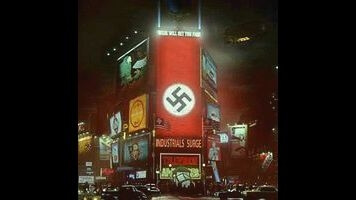The Man In The High Castle sets off some fireworks

There’s something especially unsettling about a Nazi in a green cardigan. From the beginning, many of The Man In The High Castle’s most disturbing moments have centered on Obergruppenführer John Smith: even the incongruity between his ostentatious German title and almost comically ordinary American name reads like a three-word summation of the series’ themes. So it makes sense that the first episode to spotlight Rufus Sewell’s SS officer would be especially effective at encapsulating what makes this alternate world so disquieting when the show is at its best.
“Three Monkeys” unfolds on VA Day, a holiday in the New Reich that bears a number of uncomfortable similarities to the Fourth of July. Flags are waving, but they display the Swastika and Stripes. There are fireworks and cookouts where family and friends gather, one of them hosted by Smith. You could almost believe it’s a traditional American holiday, what with father and son playing catch and all, if not for the exchanged greetings of “Sieg heil!” and the fact that Smith’s son Thomas is wearing his Hitler Youth uniform. Smith makes for a genial host, but his party is actually a trap for two different people.
The first is Rudolph Wegener, stuck waiting for a connecting flight in New York after completing his covert mission in San Francisco. When Smith and Joe run into him while ostensibly picking up Smith’s mother-in-law, it looks as if the show is continue its pattern of using incredibly coincidental chance meetings to drive the narrative. Smith and Wegener are old friends, so Wegener has little choice but to accept Smith’s invitation to lunch despite the chance of blowing his cover. The booze flows as they chat about old times, and before long Wegener is oversharing about his regrets from the war, most notably the concentration camps. As it turns out, Smith has been playing him the whole time; his mother-in-law has been dead for two years, and he went to the airport specifically to retrieve Wegener, who he knows has been traveling under a false name. When it’s time for Wegener to leave, brownshirts are waiting for him outside the front door, and there appears to be no doubt about Smith’s loyalty to the Reich.
Or is there? The other con Smith is playing involves the file marked “Grasshopper,” which Joe spotted the previous day following his debriefing. Throughout the episode, Joe is trying to get his hands on the file, pretending to go to the kitchen for snacks and sneaking the key to the cabinet where Smith has stowed the tantalizing item. It’s all a set-up, as Joe learns when he finally opens it up to find it filled with nothing but blank paper. Smith catches him red-handed, but his motives remain up in the air as the episode ends. Might Smith himself be a double agent working with the Resistance, using the file as bait to test Joe’s true loyalties? Nothing in the series so far has suggested that, but if it’s not the case, it’s going to be hard to justify Joe’s continued existence on the show. (“I’m just really curious about grasshoppers” is unlikely to fly as an explanation for his actions.)
In San Francisco, Juliana and Frank are separately finding new potential allies. Seeing as how the whole “being together” thing isn’t working out so well for them, it’s probably just as well. Despite what he’s been through, it’s not easy to maintain sympathy for Frank, particularly when he storms out of the apartment after learning that a man from the Resistance helped Juliana stay alive in Canon City. (Really, dude? That’s what sets you off? You can’t just be happy that someone helped your girlfriend not die?) Juliana returns to the Japanese Authority, where she is hired by Tagomi to pour water and provide some unofficial intelligence (as when she notes a visiting Nazi officer’s body language indicates he’s hiding something), without having to submit to any sexual favors. Juliana uses the opportunity to investigate what she thinks is a name on the business card supplied by the late Randall. It’s not a name at all, she learns, but rather the Japanese words for “speak no evil” (the third monkey of the title) and “cherry blossom,” indicating a room in the Authority where a massive surveillance operation is being conducted. Juliana encounters surprisingly little resistance in entering the room where, in yet another High Castle coincidental crossing of paths, she spots her stepfather Arnold.
For his part, Frank follows up on the chance meeting at his sister’s funeral with Mark Sampson, and learns that Sampson and his family are holding onto their Jewish faith in secret. Given the farce that was his sister’s funeral, Frank is finally able to grieve her openly as Sampson leads the group in prayer. Whether this moment leads to Frank becoming something less of a tool remains to be seen, but with the end of its sixth episode, The Man In The High Castle has left all of its main characters in intriguing places, all the better to keep us wondering what’s next.
Stray observations
- The money shot this episode is the exterior of the Lincoln Rockwell airport terminal in New York, presumably named for George Lincoln Rockwell, the founder of the American Nazi Party.
- The relentless Inspector Kido is on everyone’s case, first pressuring the antiques dealer for information on the bullets he sold (the dealer presents a false Japanese name that isn’t likely to hold up for long), then questioning Tagomi about Wegener’s disappearance the day before. Joel de la Fuente hasn’t had a whole lot to do yet, but he’s made Kido a fiercely intimidating presence.